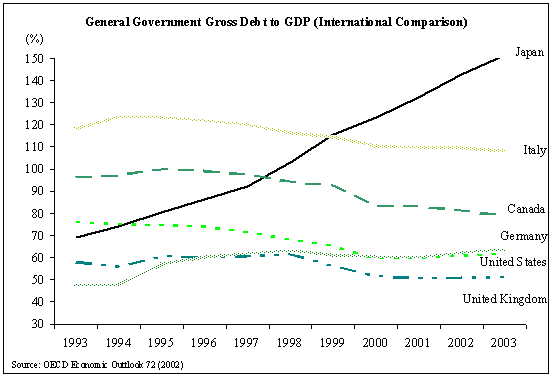Japan’s Fiscal Health Requires Cuts of 27 Trillion Yen
By the Yomiuri Shinbun
[Amid booming stock markets, record corporate profits, and talk of a Japanese economic recovery, it is easy to forget that the world economy is delicately poised atop twin peaks of debt. US public sector debt is now approaching the size of its GDP while Japan’s is well over one and a half times and heading towards double its GDP. This means mountains of debt of about equal size on both sides of the Pacific, roughly 7 to 8 trillion dollars each. Viewed from one angle, the Japanese debt is more chronic not only because of its smaller population and larger share of GDP, but because population decline carries with it a shrinking labor force and greater welfare costs. From another perspective, however, the American debt is more serious because it is owed to foreigners, rather than to US individuals and institutions. Paradoxically, a great deal of it is owed to Japan. Only the most carefully calibrated manipulation of interest rates (for many years, close to zero interest in Japan) makes it possible to keep up the necessary flow of funds to lubricate this system, while the two virtually bankupt countries nervously prop each other up.
Though reports from Japan tell of recovery after long stagnation, and suggest that the bad times are over, the following Yomiuri report provides a useful corrective; corporate balance sheets may be healthy, but the bad times, for most Japanese people, are far from over. It was former Prime Minister Obuchi Keizo who in 1999 said, half jokingly, that he was king of the world’s debtors. His successor, Koizumi, has far outdone Obuchi, or indeed any former Prime Minister in the profligacy with which he has run up debt, adding an estimated 1.5 trillion dollars (180 trillion yen) to the grand total during his tenure. Despite his talk of slimming and privatising government, the reality has been a privatizing of assets and socializing of ever larger debts. The conservative Yomiuri reports on how the bill that Koizumi and his predecessors have run up is going to be paid. Education, welfare, public works, and the military budget—public works and defense spending to less than one third present levels—are all slated to be slashed, while the consumption tax, the most regressive of taxes, to be hiked. Even then, the government’s own fiscal advisors calculate that the general budget will have to be slashed by fully one third from present levels by the year 2015. (GMcC)]
The government will have to reduce about 27 trillion yen in general-account expenditures if it wants to regain fiscal health by 2015 by only making spending cuts, according to a warning by the Fiscal System Council, an advisory panel to the finance minister, in a copy of a report obtained by The Yomiuri Shinbun.
The report on the long-term estimate of fiscal conditions predicts that the government will have to cut the size of the general account budget in fiscal 2015 by 32 percent from its fiscal 2006 level.
If this happens, it would broadly impact people’s lives, including disaster prevention, welfare and education, the report warns.
The council argues in the report that spending cuts should be used along with tax increases to achieve the goal of recovering fiscal health.
Economists say the report will influence the government’s plan to reform its revenue sources and expenditure to be compiled in June. The council made the long-term estimate at the request of the Council on Economic and Fiscal Policy, which is chaired by Prime Minister Koizumi Junichiro. The report will be officially submitted at a meeting Monday of the Fiscal System Council.
The report estimates figures for lowering the percentage of the outstanding amount of government bonds against the nation’s gross domestic product.
For fiscal 2006, the outstanding amount of government bonds has been estimated at 542 trillion yen, which accounts for 105 percent of GDP. The government plans to lower the figure starting in fiscal 2015.
To achieve this goal, expenditures under the fiscal 2015 general account should be reduced by 27 trillion yen, compared with fiscal 2006. To cut the amount using only spending cuts, the government will have to cut total spending by 32 percent while shifting the burden of welfare from the state to the individual, the report says.
With regard to social welfare, a patient’s own payment for medical treatment will become 1.6 times the current amount, and an elderly person’s own payment for nursing care services will quadruple, the report predicts.
The report also says that if spending cuts in social welfare, tax revenue allocation to local governments and personnel costs of public servants are kept small, with the government aiming to cut spending in other fields, public works spending will be only 2.2 trillion yen–about 30 percent of the current level.
At that amount, the report says, the government will only be able to repair and maintain roads, bridges and other large-scale infrastructure, making any new projects impossible.
The report also says the defense budget will only be about 30 percent of its fiscal 2006 level, and the Self-Defense Forces will be unable to conduct disaster relief activities.
Tuition fees at state-run universities will be 3.8 times the current level, and the average response time of a police car to an emergency call will be about 30 minutes instead of the current wait of about seven minutes.
This report appeared in the Yomiuri Shinbun on March 26, 2006.



